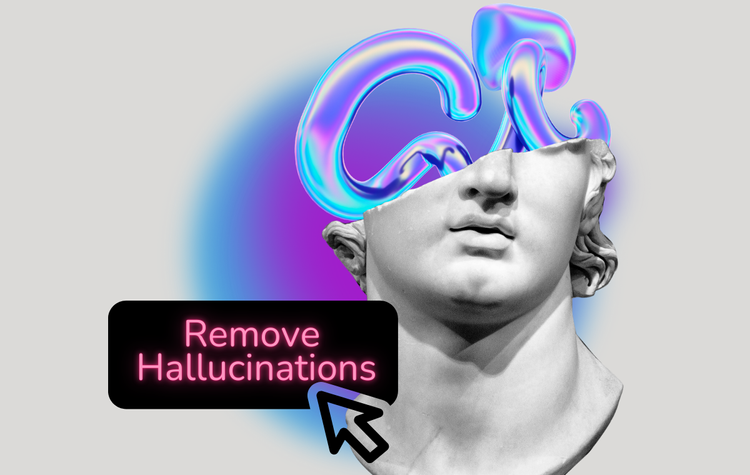How to Evaluate White Label AI Software
Creating a generative AI chatbot requires a lot of resources and know-how. Smart software companies businesses don't start from zero; they white label AI software like Gleen AI. Gleen AI is a leading generative AI chatbot platform that can be white labelled. And, it doesn't hallucinate.

Introduction
Generative AI chatbots are now essential in customer support. They make interactions quick and personalized at an exceptional scale. In Gleen's recent survey, 75% of CX executives plan on deploying generative AI chatbots in the next 12 months.
Creating a chatbot sounds attractive to engineers, but it needs many resources and expertise. It also requires lead time and a commitment to maintain the application.
Many companies want generative AI capabilities within their software. They recognize that white label artificial intelligence chatbot solutions offer faster time to market and customization. This empowers businesses to use these solutions rapidly under their own brand.
This article explores the benefits of white label AI software and discusses how to select them.
What is White Label AI Software?
White label software is software that one company licenses to another software company. The company can rebrand the software and sell it separately or include it within an existing product.
Lots of companies do this, especially in SaaS and marketing.
White label AI software is a customizable solution for businesses. It lets you completely re-brand it, seamlessly fitting into your existing applications.
This means the software matches your brand's look and feels like a natural part of your business, not a separate tool. The white label approach ensures a consistent user experience. It also reinforces your brand while using AI to meet specific business needs.
This article will specifically explore white label AI chatbots, discuss their advantages, and learn how to choose them.
Benefits of a White Label AI Chatbot Solution
1. Quick Deployment
You can set up white label AI chatbots quickly. This saves time and helps generate profits faster.
White label AI chatbots smoothly integrate into existing software quickly, avoiding prolonged development.
2. Cost-Effective
Creating and maintaining a chatbot from scratch is resource-intensive, requiring dedicated teams for development, design, and ongoing maintenance.
White label AI chatbot solutions offers a budget-friendly option with pre-built frameworks, significantly cutting development costs.
3. Customization
The best white label AI software allow software companies to showcase their brand identity.
By adding their logo to the chatbot interface, companies create a consistent user experience. This reinforces their brand within their software ecosystem.
4. Protecting Your Data
To keep your customers' data safe, good white label software providers follow industry standards for security and privacy standards. This helps make sure your information stays private and secure.
5. Focus
White label AI chatbot solutions allow you to add generative AI to your software platform.
This helps you focus on your core application and prevents distractions from generative AI.
6. GTM Flexibility
White label AI chatbots don't just integrate; they offer flexibility.
Software firms can offer generative AI chatbots as an optional add-on to an existing software license.
They can also add generative AI chatbots as a value-added service and absorb the license fees.
What to Consider When Selecting a White Label AI Software Solution
In your search for the best white label AI chatbot platform, there are many things to consider. With many chatbot options, being discerning is key. So, here's the full list:
(1) Deployment Versatility
Some factors to consider include:
- The ability to host the chatbot application on AWS, Azure, or Google Cloud
- The availability of both multi-tenant and single-tenant deployment models to cater to your clients's security needs
- The availability of dedicated host dpeloyments
- Omnichannel integration, including web chat, Slack, Discord, email, and seamless integration with leading help desk solutions.
(2) Tailoring
The ideal chatbot goes beyond looks, reflecting your brand's language and style. For instance, a Disney chatbot should communicate distinctly from a banking chatbot.
(3) Proprietary Knowledge Upload
You should be able to upload a proprietary knowledge base about your company. Or, if applicable, your clients should be able to upload proprietary knowledge about their companies.
The chatbot solution should collect information from FAQs, wikis, community portals, and resolved help desk tickets.
The chatbot solution should not require extensive knowledge preparation from either you or your clients.
(4) Security
White label AI chatbot solutions should use strong encryption and follow data privacy standards to protect client information.
(5) Relevant and Accurate Answers
The whitelabel chatbot should be able to understand complex questions and provide highly relevant and accurate answers.
More specifically, the whitelabel chatbot shouldn't hallucinate. Hallucination is the tendency for generative AI chatbots to make up facts. You need to be confident your white label chatbot solution doesn't hallucinate.
LLMs simply predict the next word in a conversation. They don't know if the generated response is accurate or not.
Any AI chatbot that only depends on the response of the LLM will also hallucinate.
Not all generative AI chatbots hallucinate. For example, Gleen AI is a generative AI chatbot platform that doesn't hallucinate.
Ask for a Gleen AI demonstration or build a generative AI chatbot at no cost with Gleen AI.
(6) Maintenance
A good white label AI chatbot solution should be easy to maintain. Consider these factors:
- Is there a way your customers to monitor both questions and the chatbot's generated answers?
- Can your customers (and their end users) provide feedback on responses?
- Does the chatbot improve response quality based on feedback?
- How does the chatbot become aware of new knowledge?
- How does the chatbot update responses based on new knowledge?
(7) Reliability
How much uptime does the white label AI chatbot have?
How much scheduled and unscheduled downtime does it have?
What happens during downtime?
(8) Easy Transfer to Humans
The chatbot should smoothly transfer to human agents when necessary.
Generative AI chatbots may not answer all questions, so human help is available for a personal touch when needed.
Customers can set up the chatbot to switch to live chat during business hours and email after business hours.
(9) Language Models (LLMs)
Businesses have different needs, and the need for a particular LLM can change.
Gleen's flexible setup lets clients choose which LLM their chatbot interacts with. The LLM can be managed (like GPT-3.5 or GPT-4), or it can be self-hosted.
(10) Smart Engagement
Can the bot do more and interact with users to boost important business results? Check these examples:
- Handle tasks like scheduling meetings, placing orders, or halting processes.
- Spot potential leads and alert you about new leads.
(11) Analytics
Good analytics are a must. They highlight key metrics, showing where you can improve, like finding gaps in your knowledge management.
(12) Support Service Level Agreements (SLAs)
When using the white label AI chatbot solution, your clients might need help. The support SLA should be fair and fit your operating needs.
Conclusion
Generative AI chatbots are changing customer service, and white label AI software options offer speed and cost advantages.
Software companies can easily incorporate generative AI using these white label solutions, staying competitive in digital customer service.
Gleen AI is the world's most accurate generative AI platform for customer support. Gleen AI can be white labeled and meets all the above criteria for best-in-class white label AI software.
Get a demo of Gleen AI or build a generative AI chatbot at no cost with Gleen AI now.



